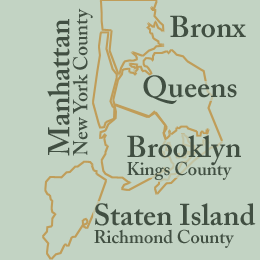Civil Court History
The Civil Court of the City of New York was established on September 1, 1962 as a result of the merger of the City Court and the Municipal Court of the City of New York. This merger was part of a statewide court reorganization in response to Gov. Thomas E. Dewey's Tweed Commission, which issued its recommendations in 1958.
Over the years the Civil Court's jurisdiction has increased a number of times. Staffing has also increased due to a desire by court administrators and the State Legislature to improve services to the Court's litigants.
Significant changes in the Court include the following:
1. The establishment of a Housing Part, with Part specific hearing officers, now called Housing Court Judges, was initially started in 1973, with ten judges. We now have 50 Housing Court Judges. These parts were originally staffed by a judge and a court officer, but now also have one or two court attorneys, clerks and interpreters, servicing many languages. Up until the Chief Judge Judith Kaye's Housing Initiative in 1997, the Housing Part operated with a master calendar system. Since 1997, the parts have been divided into resolution (or conference) and trial parts, with cases being assigned to them randomly from the clerk's office.
2. The small claims part of our Court celebrated its 70th Anniversary in 2004. It was first founded in 1934 as part of the Municipal Court, with a jurisdiction of $50. The dollar amount has been increased periodically to the present amount of $5,000, which became effective on January 1, 2004. Evening sessions were instituted in 1954, with a weekly day session available only for those unable to attend the night session due to age or disability. In 1934, the small claims parts disposed of 11,190 cases. This volume grew to over 50,000. In 1991 a commercial part was created to serve corporations, partnerships and associations.
3. The merger of the Municipal and City Courts in 1962 resulted in the Courts in each borough being centralized in one location. This practice has continued until recent years, when Chief Judge Judith Kaye began experimenting with community courts or "justice centers", which are now located in mid-town Manhattan, Harlem and Red Hook in Brooklyn. The Civil Court provides housing case services in Red Hook, and housing and small claims in Harlem. Of note, we had operated a one-night a week small claims part in Harlem since 1971,when we opened this court in conjunction with the NYC Dept. of Consumer Affairs.
The Civil Court is the largest civil jurisdiction court, by volume, in the United States. Our Housing Part, also the largest of its type in the Country, has averaged about 350,000 filings a year for the past 20 years, while our Small Claims Part has averaged about 50,000 cases during the past two decades. Our general Civil Part saw its volume decrease significantly when "no fault" automobile insurance legislation was implemented. Over the past twenty years, an average of 225,000 cases were filed annually. However, recent insurance regulations involving prompt payment for doctors in no-fault cases, as well as a large increase in consumer credit cases, has dramatically increased filings over the last two years, averaging about 600,000 filings since 2006. Our combined filings presently represent about 25% of all of the New York State Court system's total filings (including criminal, family, traffic and civil). Impressively, this work load is handled by only 6% of the court system's work force, which is a testament to the dedication, skill and hard work of the Civil Court's judicial and non-judicial staff.
A video entitled: "New York City's Housing Court at 40: Controversies, Challenges and Prospects for its Future" explains much of the history of the Part through a collection of interviews with people who were involved with the Part's creation.


